Tag Archives: Development
Posted on July 15, 2016 by Sophie Hicks
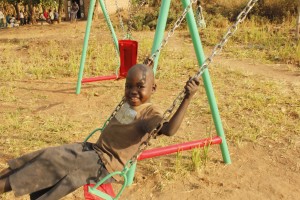
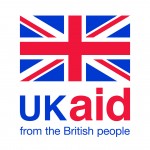
Much of a child’s early years are spent playing, exploring and testing their environment and own personal boundaries. All of this play has significant and proven benefits for a child’s early development. Research has shown that children who regularly engage in play-based learning have better cognitive flexibility, working memory and self-regulation ability.
Here at African Revival, we recognise the immense benefits of play-based learning and have incorporated it as one of the major elements of our jumpstart! nursery education programme. In our 10 jumpstart! schools, we are building playgrounds, training teachers in how to guide play-based learning and make their own play materials using natural materials, and even teaching parents how to encourage productive play at home. We know that play is incredibly important for early childhood development – but what exactly are the top benefits?
- Better behaviour
Children behave better in the classroom when they have had the chance to blow off steam and release energy on the playground during the day. Playing is a known method of stress release that can help with a child’s emotional welfare, as nursery teacher Gino, from Purongo Hill Primary School in Nwoya district says: “the playground is where the children release their stress and refresh their minds between learning”
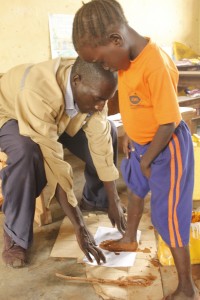
- Good social skills
Play can help young children become more aware of other people’s feelings and develop empathy. During play, whether it is inside or outside of the environment, children must interact and cooperate with each other, as well as share play equipment which requires good communication skills. Children can build relationships, learn to resolve conflicts, negotiate and regulate their emotions and behaviors. According to nursery teacher Gino, increased play-based learning at Purongo Hill has “eliminated that spirit of being selfish, and also helping the children with sharing because of that thing of collaboration”
- Improves academic performance
In 2009, research from the American Journal of School Health found that the more physical activity tests children can pass, the more likely they are to do well on academic tests. According to psychologist Kathryn Hirsch Pasek, “Children learn to count when they’re doing hopscotch […] They are telling stories on the playground, and they’re getting active.”
Furthermore, play can nurture qualities like self-discipline and attentional control, which can be just as vital for school readiness as content knowledge. Children with longer attention spans and self-control can focus more on tasks in the classroom. This is because when children engage in make-believe play that involves role playing, there are generally rules that they must follow which involves regulating their natural self and behavior. By practicing this in a safe, fun environment, their self-control is enhanced, which can then be transferred to a classroom setting.
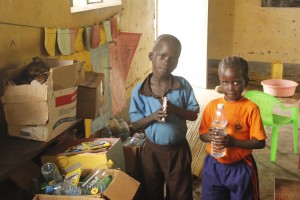
- Language development
Moreover, make-believe play that involves role playing can also help children to develop their language skills, as was shown in a British study (Lewis, 2000). Infant pupils were asked to engage in symbolic play, whereby they use objects, actions or ideas to represent other objects, actions or ideas. For example, a child may put a wooden block to her ear as a pretend mobile phone. Children who scored higher on a test of symbolic play had better language skills, both in terms of what they understood and spoke. This suggests that play helps to develop and solidify language skills.
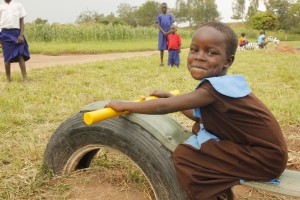
- Increases enthusiasm for learning
In northern Uganda, where drop out rates amongst primary school students are very high, play-based learning can encourage pupils to stay in school and attend more frequently. Indeed, at Purongo Hill Primary School in Nwoya district, nursery teacher Gino says that enrolment has skyrocketed since African Revival constructed a playground at the school (from 30 pupils in the nursery section to 120): “the playground has been an advantage to us because it has drawn in children, increased enrolment and reduced drop outs”.
Posted in News |
Tagged Acholi, African Revival, Development, ECD, Headteacher, inspiration, Inspiring Head Teacher, International Development, Jumpstart!, play, Teacher training, Uganda |
Leave a comment
Posted on June 16, 2016 by Sophie Hicks
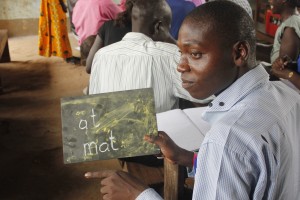 African Revival recently organised a 3- day phonics training for Koch Goma Primary School with phonics trainers Jody Spencer and Akello Catherine. Jody and Catherine used the Fun of Phonics curriculum, which has been adapted by Jody from international phonics programmes to fit the local teaching environment in Uganda. Teachers were trained in a multisensory synthetics phonics approach using actions and song, and practiced using teaching methods such as pair reading.
African Revival recently organised a 3- day phonics training for Koch Goma Primary School with phonics trainers Jody Spencer and Akello Catherine. Jody and Catherine used the Fun of Phonics curriculum, which has been adapted by Jody from international phonics programmes to fit the local teaching environment in Uganda. Teachers were trained in a multisensory synthetics phonics approach using actions and song, and practiced using teaching methods such as pair reading.
But what is phonics? How is it different from teaching children to read using the rote memorization technique? And why is it so effective? Find out all you ever wanted to know about phonics here!
What is phonics?
Phonics is a method of teaching reading and writing that focuses on sounds. In the English language there are only 26 letters in the alphabet, however there are 44 sounds and 120 main ways of writing these sounds. Phonics teaches children to recognise and write these sounds by training them to correlate these different sounds (phonemes) with letters (graphemes).
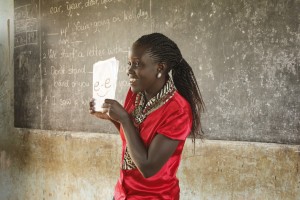 Take an example
Take an example
Phonemes are the smallest units of sound that make up a word.
Take the word ‘star’. While it consists of only one syllable, it contains four different phonemes: /s/ /t/ /a/ /r/. When teaching phonics, children will be taught the sound each phoneme makes, then how to put these sounds together to sound out the whole word.
Some sounds have one letter, while others have two or three. For example, the word ‘fish’ has four letters but only three sounds – the letters ‘sh’ make one sound but are two letters.
Why is phonics an effective teaching method?
A written language is basically a kind of a code. Teaching phonics is just teaching children to crack that code by learning to recognize the sounds of letters and different letter combinations. Children learn the simple bits first and then easily progress to get the hang of the trickier bits. Phonics gives children the skills to decode new words that they have not been taught by sounding them out, therefore equipping them with the skills to read and write independently.
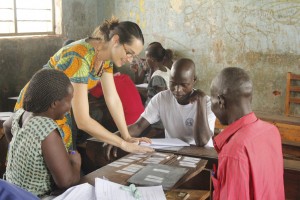 Is phonics effective?
Is phonics effective?
Yes. A study in the UK led by Educational Psychologist Marlynne Grant has shown the effectiveness of phonics instruction at nursery and primary level. The study followed a group of 30 children who were taught using phonics for the first time in nursery, and tracked their progress for three years, to the end of year two in primary school. Grant’s research found that in 2013, members of the year two class of seven-year-olds were on average 28 months ahead of their chronological age for reading and 21 months above their age for spelling.
Why is rote learning not effective?
Rote learning is a memorisation technique centred on repetition and cramming. It is based on the idea that the more a child repeats a piece of information, the quicker they will be able to recall it. However, this quick recall often comes at the expense of a deeper understanding because rote learning does not focus on comprehension.
In Uganda, pupils are often taught English using this rote learning method. Children are taught to repeat and memorize particular sentences and words, but are not taught how to decipher specific sounds in words. This means that some children can read words they have already been taught, but cannot tackle new words on their own. Other children, however, find it difficult to memorize words and can progress through primary school with a limited reading ability. Many children leave primary school without being able to read independently when taught using rote memorization.
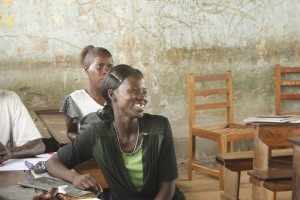 What are literacy levels in Uganda?
What are literacy levels in Uganda?
Across Uganda, one third of youth are illiterate and pass rates for English amongst children aged 10-16 are only 47% (Uwezo). In many schools, especially those in poorer rural areas, quality of education remains poor and teachers lack practical skills and educational resources. Many children leave school without the ability to read simple sentences that they have not already been taught.
Why does literacy matter?
Children’s poor skills in reading and writing have a direct result on their results in other academic subjects such as mathematics and science because the main academic language for exams in primary school is English. Children who cannot read and understand questions for these subjects often perform poorly in exams and do not develop literacy skills vital for success in the workplace and beyond.
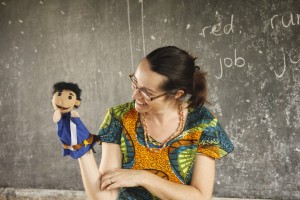 How can training teachers in phonics help improve literacy levels?
How can training teachers in phonics help improve literacy levels?
The root cause of illiteracy is the way teachers are trained in Uganda. In general, they are taught to use rote memorisation to train pupils to read and write, often graduating from Primary Teaching College without being confident in teaching English. In some rural schools, some teachers struggle with the English language themselves following years of poor instruction, so struggle to teach the language in the classroom. Moreover, they lack skills in effective, research-based teaching methods which engage learners. By training teachers in phonics methodology, they will be equipped with the skills to teach children how to decode new words and give them the framework to independently develop their literacy level. Strong literacy skills will help students to improve their performance in other subject areas, with general comprehension across subjects enhanced by the ability to read and write well.
Posted in News |
Tagged African Revival, Changemaker, Development, ECD, Education, Gulu, inspiration, Inspiring Head Teacher, International Development, Jumpstart!, Nursery School, School Development, Teacher training |
Leave a comment
Posted on April 11, 2016 by Sophie Hicks
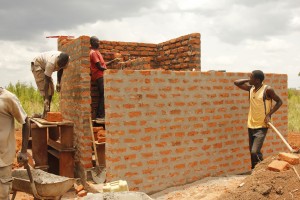 At African Revival, we always ask the communities who benefit from our construction projects to make a contribution. This can be either financial or in the form of labour and resources. But why ask for this contribution? Why is it important for the success of the project? In this article, we explore the benefits of community contribution and ask Construction Coordinator Vincent about what motivates parents to contribute.
At African Revival, we always ask the communities who benefit from our construction projects to make a contribution. This can be either financial or in the form of labour and resources. But why ask for this contribution? Why is it important for the success of the project? In this article, we explore the benefits of community contribution and ask Construction Coordinator Vincent about what motivates parents to contribute.
When an outside organisation comes into a rural community to work on a construction project, there is a risk that the community members see the building as belonging to an outside agency. Often this means that they do not have a feeling of responsibility towards it and in many cases do not properly maintain it. They see this as the duty of the outside organisation. This can mean construction projects fall into disrepair and are not sustainable in the long term.
In order for the community to properly maintain a building, they must feel some sense of ownership towards it. Community contribution of money, labour or resources can help generate this sense of ownership and make a project more sustainable, as Construction Coordinator Vincent explains: “If the community make a contribution, the sense of ownership gets into them. In most interventions that have been going on in the construction industry, we realise that after a while the community still doesn’t own the place, even if you hand over officially to them. So we want them to own the latrine, right from the onset”
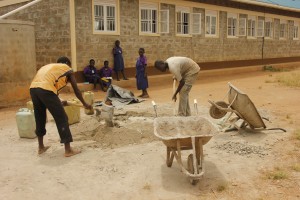 This sense of ownership can be generated by involving the community members right from the start, by consulting them about their real needs, involving them in the planning process and asking them what they can realistically contribute. A community in a rural setting may want to contribute building materials sourced from the local environment, which costs them nothing, while a town-based community may not have access to natural building materials and may choose instead to contribute in cash. Whatever the contribution, it encourages a sense of duty and pride towards the new facility, as Vincent describes: “If they contribute, the community feels more ownership than when someone just gives it to them. So that means if the facilities are completed they will take care of it. They will try to see that nobody messes it up. If there is any burglary, they are willing to take care of the security. They rejoice at the end of the day that this is their labour, their contribution. They feel proud that they have contributed for the construction of a classroom, now their children are able to use the facility”
This sense of ownership can be generated by involving the community members right from the start, by consulting them about their real needs, involving them in the planning process and asking them what they can realistically contribute. A community in a rural setting may want to contribute building materials sourced from the local environment, which costs them nothing, while a town-based community may not have access to natural building materials and may choose instead to contribute in cash. Whatever the contribution, it encourages a sense of duty and pride towards the new facility, as Vincent describes: “If they contribute, the community feels more ownership than when someone just gives it to them. So that means if the facilities are completed they will take care of it. They will try to see that nobody messes it up. If there is any burglary, they are willing to take care of the security. They rejoice at the end of the day that this is their labour, their contribution. They feel proud that they have contributed for the construction of a classroom, now their children are able to use the facility”
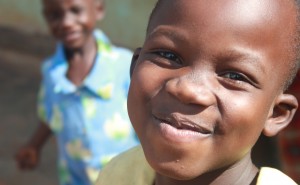 Voluntary provision of labour, time, money and materials can also help to break patterns of dependency and passivity. If the community knows that in order to benefit from a construction project, they will also need to contribute, this can help to counteract a hand-out culture inspired by decades of free projects and facilities. Involving a community in the planning and implementation process can also empower individuals by giving them decision-making power over their own futures, as well as imparting new knowledge and skills – for instance knowledge about proper planning or new construction skills. All these factors contribute to the long term sustainability of the project by encouraging responsibility amongst the community and giving them the skills they need to properly maintain a construction project.
Voluntary provision of labour, time, money and materials can also help to break patterns of dependency and passivity. If the community knows that in order to benefit from a construction project, they will also need to contribute, this can help to counteract a hand-out culture inspired by decades of free projects and facilities. Involving a community in the planning and implementation process can also empower individuals by giving them decision-making power over their own futures, as well as imparting new knowledge and skills – for instance knowledge about proper planning or new construction skills. All these factors contribute to the long term sustainability of the project by encouraging responsibility amongst the community and giving them the skills they need to properly maintain a construction project.
But what motivates a community to contribute? According to Vincent, it is a desire to see the best for all the members of that community, and in the case of school construction projects, a better future for their children:“Some may want their children to be in a safe environment. If the environment is good, that means the education is better. Most importantly, it is about the future of the children who attend the school. The community want to see a child have a better future. If there is anything that they can do, like development fees, like personal labour – that is the driving force that makes community members give contributions”
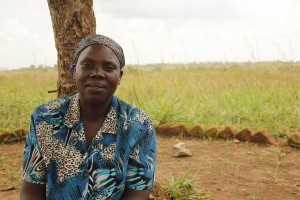 Community member Christine, a parent at Teddi Community School where African Revival recently constructed a new block of latrines, agrees: “We don’t contribute because of a penalty or a demand. We contribute because we want to see this school and community development and want to be part of that process.” At Teddi, the parents contributed 1000UGX for each of their children enrolled at the school. They also signed a maintenance agreement with African Revival, which hands over responsibility for all upkeep to the School Management Committee. While we will always be there to offer support to this particular community, they are motivated to care for the facility because it has improved sanitation at the school, especially for the female pupils, as parent Sharon explains: “I was happy to contribute to the latrine. Now our girls have more privacy”.
Community member Christine, a parent at Teddi Community School where African Revival recently constructed a new block of latrines, agrees: “We don’t contribute because of a penalty or a demand. We contribute because we want to see this school and community development and want to be part of that process.” At Teddi, the parents contributed 1000UGX for each of their children enrolled at the school. They also signed a maintenance agreement with African Revival, which hands over responsibility for all upkeep to the School Management Committee. While we will always be there to offer support to this particular community, they are motivated to care for the facility because it has improved sanitation at the school, especially for the female pupils, as parent Sharon explains: “I was happy to contribute to the latrine. Now our girls have more privacy”.
Overall, community contribution to construction projects ensures the long term sustainability of that project, while also giving communities more authority over their own development and futures.
Posted in News |
Tagged African Revival, community contribution, community development, Development, Education, Gulu, inspiration, International Development, Lord's Resistance Army, School Development, Teacher training |
Leave a comment
Posted on February 23, 2016 by Sophie Hicks
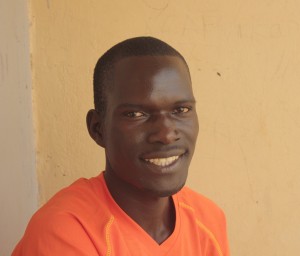

Sunday is only 22 years old, yet already he is the headteacher of Lacek Community School in Nwoya district! To hold such an important position at such a young age is testimony to both his considerable talents as a teacher and to how highly he is considered in the surrounding community. But Sunday is not just a Headteacher. He is also participating in the Teacher Changemaker network, which we coordinate in partnership with STIR Education in Northern Uganda! So far, Sunday has implemented an incredibly successful Village Savings and Loans Association in Lacek School (they have saved an impressive 3,775,400 since May) which is also helping to bring parents closer to the school to monitor their children’s education, improving student motivation and performance. Read on to discover how Sunday is changing the way the local community views education and impacting on the next generation at Lacek Community School!
My parents were escaping from the Lord’s Resistence Army, so I was born in Gulu. But our original homeland is in Kinene. We moved back to Kinene in 2006 when the war ended. I was 13 years old. I have only 3 brothers without any girls. My mother gave birth to 4 girls but they all passed away. There were only 4 boys left. I have four half brothers and sisters from my fathers second wife. We all live together in Kinene. My father had many wives, almost 11. He is 80 years old now.
Teaching became interesting to me because of a certain teacher in my primary, called Mr Laloo. That teacher really made me who I am. I struggled to learn English, so he put a lot of work into teaching me how to speak and write well. I liked the way he taught me, and I promised to myself I would become a teacher.
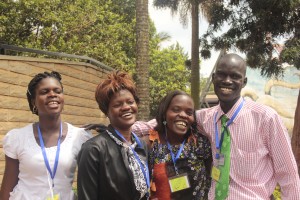 Being part of the Teacher Changemaker network made me realise that the problem in our schools is parent engagement. It touches me. There is a lack of parent engagement in these communities – parents have very negative attitudes towards education. I saw that many were not able to pay their children in school. I sat down with the School Management Committees and asked, which is the best way we can help these parents? I decided to bring the Village Savings and Loans Association (VSLA), which other localities are doing successfully. When they save money for 2 months, that money alone is able to pay the school fees for their children. So I decided to mobilize parents. Many parents joined me. Every week they come and save their money in the pool. So far they have saved 3,775,400 (since May 2015).
Being part of the Teacher Changemaker network made me realise that the problem in our schools is parent engagement. It touches me. There is a lack of parent engagement in these communities – parents have very negative attitudes towards education. I saw that many were not able to pay their children in school. I sat down with the School Management Committees and asked, which is the best way we can help these parents? I decided to bring the Village Savings and Loans Association (VSLA), which other localities are doing successfully. When they save money for 2 months, that money alone is able to pay the school fees for their children. So I decided to mobilize parents. Many parents joined me. Every week they come and save their money in the pool. So far they have saved 3,775,400 (since May 2015).
Children are getting benefits from their parents being in the VSLA. Their parents can borrow money and pay them, buy for them uniform, the scholastic materials. Also, the parents are able to monitor their children, whether they are in the class, whether they are learning. They first move around all the school compound checking what is wrong, what is good, and they feedback later.
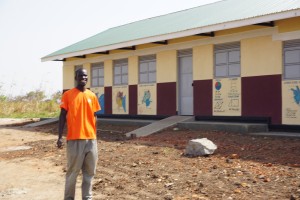 In our culture, when you are a teacher, people prefer to be like you, because teachers are able to make unknown known. So people take teachers as the most important thing for the community. The change makers. Whenever there are any problems they first consult the teacher. During village meetings, I am always the chief’s guest when they are making bylaws. I help them to decide which ways to manage the schools and build the community. And when we are making school rules, we invite the chiefs to help. So when the child is not at school, we can give a phone call to the chief to inform him about the problem within his area of service.
In our culture, when you are a teacher, people prefer to be like you, because teachers are able to make unknown known. So people take teachers as the most important thing for the community. The change makers. Whenever there are any problems they first consult the teacher. During village meetings, I am always the chief’s guest when they are making bylaws. I help them to decide which ways to manage the schools and build the community. And when we are making school rules, we invite the chiefs to help. So when the child is not at school, we can give a phone call to the chief to inform him about the problem within his area of service.
I am getting some great advice from the network, like its OK to make mistakes. For us we take mistakes as a very bad thing. When we make mistakes in the Ugandan education system, people do not like it. But when I see anyone making mistakes, I just help them, and do not tell them off. The network always tells us that through mistakes, you can learn.
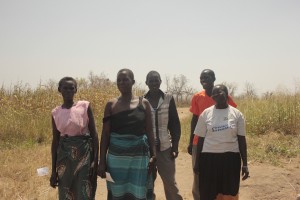 The part of the network that has motivated me a lot is friendship. Before, I didn’t know any of the other teachers in Nwoya district who are now in the network. I speak with my friend Gino (a pre-primary teacher at Purongo Hill Primary School) by phone almost daily. We just call each other and share the things from our day.
The part of the network that has motivated me a lot is friendship. Before, I didn’t know any of the other teachers in Nwoya district who are now in the network. I speak with my friend Gino (a pre-primary teacher at Purongo Hill Primary School) by phone almost daily. We just call each other and share the things from our day.
In the future, after going for my ECD diploma, I’m hoping to be a tutor and train teachers in Early Childhood Development. I can see myself so much specialised in the ECD because I understand young children’s behaviour.
My daughter, she is very stubborn! She is around 2 years old. At around 1 ½ years, she was also able to speak. She acquired language very early. I play with her everyday, even if she is not understanding everything I say. She is called Akello Charity Hope. She loves playing, she plays so much. When I reach home in the evening, we sing songs together. I will arrive and she will immediately come to me to sing songs, to speak funny things. In the future I want her to be like me – a teacher.
Posted in News |
Tagged Acholi, African Revival, Changemaker, Development, ECD, Education, endurance, Gulu, Headteacher, inspiration, International Development, Interview, Jumpstart!, Kampala, Nursery, Nursery School, Profile, Pupils, School, School Development, STIREducation, Teacher training, Uganda, World Teachers' Day |
Leave a comment
Posted on February 17, 2016 by Sophie Hicks
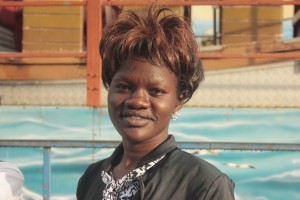

Irene started her early career as a tap dancer. Trained for a year by a man from California named Jack, she still has a real passion for the dance with ‘the glass shoes’. Now an Early Childhood Development teacher in Anaka P7 Primary School in Nwoya district, Northern Uganda, she regularly brings song and dance into her lessons as a way of energising her pupils and bringing her classroom alive. This interactive style of teaching is just one of the things she has learned from participating in Teacher Changemaker network, implemented by STIR Education and coordinated in Nwoya district by African Revival.
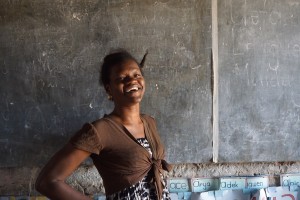 The Teacher Changemaker network encourages teachers across Uganda to introduce ‘micro innovations’, new techniques to increase the quality of education, into their lessons to respond to the challenges they face in the Ugandan education system. For Irene and her colleagues at Anaka P7, one of the main challenges is lack of parental engagement: “We decided that parental engagement is the biggest problem affecting our school. There are parents that, when you call them for a meeting, they don’t want to come. They don’t provide the scholastic materials for their children. You find a child will come to school hungry, without having eaten, and not be able to concentrate in class. Children like this end up failing.” She and her fellow teachers have introduced a procedure to counteract this challenge: “The first step is to call the parents for a meeting. The second stage is to go up to the home to see what is the problem stopping this child from performing. And the time comes when the parents start to listen, slowly, until they are now following the advice of the teacher. We have used this procedure and now there are many who come to check the progress of the children”. This micro innovation is already having positive results. This year, more children in Irene’s class passed, and she has noticed a change in the attitude of her students in class, now their parents are taking more of an interest in their education.
The Teacher Changemaker network encourages teachers across Uganda to introduce ‘micro innovations’, new techniques to increase the quality of education, into their lessons to respond to the challenges they face in the Ugandan education system. For Irene and her colleagues at Anaka P7, one of the main challenges is lack of parental engagement: “We decided that parental engagement is the biggest problem affecting our school. There are parents that, when you call them for a meeting, they don’t want to come. They don’t provide the scholastic materials for their children. You find a child will come to school hungry, without having eaten, and not be able to concentrate in class. Children like this end up failing.” She and her fellow teachers have introduced a procedure to counteract this challenge: “The first step is to call the parents for a meeting. The second stage is to go up to the home to see what is the problem stopping this child from performing. And the time comes when the parents start to listen, slowly, until they are now following the advice of the teacher. We have used this procedure and now there are many who come to check the progress of the children”. This micro innovation is already having positive results. This year, more children in Irene’s class passed, and she has noticed a change in the attitude of her students in class, now their parents are taking more of an interest in their education.
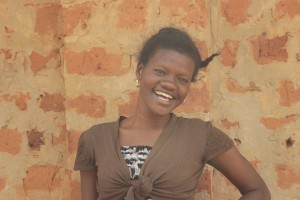 Irene is confident that the innovations and increased focus on critical analysis and problem solving that the Changemaker network has facilitated will continue to have a positive impact on her primary school: “as long as we keep innovations coming to Anaka p7, there will be a great many positive changes. Though we have some parents who don’t listen to the school, in time there will be a lot of improvements because us teachers have learned ways of solving the problems we face”
Irene is confident that the innovations and increased focus on critical analysis and problem solving that the Changemaker network has facilitated will continue to have a positive impact on her primary school: “as long as we keep innovations coming to Anaka p7, there will be a great many positive changes. Though we have some parents who don’t listen to the school, in time there will be a lot of improvements because us teachers have learned ways of solving the problems we face”
The network is also having a positive impact on Irene’s confidence and motivation as a teacher: “The network taught me that, if you are a teacher, you should have confidence in everything you do, you should be exemplary, you should have knowledge, you should be someone who searches for things that will make a change. Someone creative in the mind who will search for ways to make the children learn well and pass”.
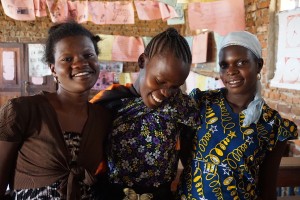 She also enjoys the unity and collaboration with the other Teacher Changemakers, which is a real advantage for all participants. Teaching in any part of the world can be a difficult job, and in Uganda the lack of good infrastructure, teaching materials and training exacerbates the already considerable challenges. By encouraging teachers to share and support each other, the Teacher Changemaker network is looking to alleviate these challenges through an informal support system that allows participants to vocalise their problems and search for solutions together. This style of network also means that innovations produced by the teachers are tailored to the specific localised environments across Uganda, rather than ready-made solutions designed out of context. This contributes to the success of the network and its popularity amongst its Changemakers, especially Irene, who advised teachers to try out the new Changemaker innovations for themselves: “My advice for other teachers is this: go and put the micro innovations into use, because they will help a lot. And help you learn how to communicate with others, discuss, be social and cooperative and many others. When you go back to school tell others to do the same!”
She also enjoys the unity and collaboration with the other Teacher Changemakers, which is a real advantage for all participants. Teaching in any part of the world can be a difficult job, and in Uganda the lack of good infrastructure, teaching materials and training exacerbates the already considerable challenges. By encouraging teachers to share and support each other, the Teacher Changemaker network is looking to alleviate these challenges through an informal support system that allows participants to vocalise their problems and search for solutions together. This style of network also means that innovations produced by the teachers are tailored to the specific localised environments across Uganda, rather than ready-made solutions designed out of context. This contributes to the success of the network and its popularity amongst its Changemakers, especially Irene, who advised teachers to try out the new Changemaker innovations for themselves: “My advice for other teachers is this: go and put the micro innovations into use, because they will help a lot. And help you learn how to communicate with others, discuss, be social and cooperative and many others. When you go back to school tell others to do the same!”
Posted in News |
Tagged Acholi, African Revival, Changemaker, Development, ECD, Education, inspiration, International Development, Jumpstart!, Kampala, Kilimanjaro, Nursery, Nursery School, Profile, Pupils, School, School Development, STIREducation, Teacher, Teacher training, Uganda |
Leave a comment
Posted on February 11, 2016 by Sophie Hicks
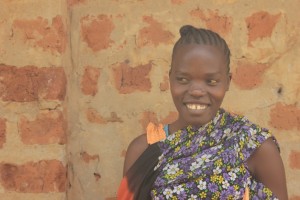 Kevin, aged 23, is a primary teacher from Anaka P7 Primary School, and a fantastic Teacher Changemaker! She is participating in STIR Education’s Teacher Changemaker network, which is designed for teachers to share ideas and innovations, as well as to provide a source of motivation for educators in what can be a difficult working environment. African Revival’s Jumpstart! team has been helping STIR to manage the network in Nwoya district, where we caught up with Kevin to find out how the Changemaker network is benefitting her and her students!
Kevin, aged 23, is a primary teacher from Anaka P7 Primary School, and a fantastic Teacher Changemaker! She is participating in STIR Education’s Teacher Changemaker network, which is designed for teachers to share ideas and innovations, as well as to provide a source of motivation for educators in what can be a difficult working environment. African Revival’s Jumpstart! team has been helping STIR to manage the network in Nwoya district, where we caught up with Kevin to find out how the Changemaker network is benefitting her and her students!
I teach in the primary section of Anaka P7. I like the lower primary classes because they are young and friendly, so I enjoy interacting with them. The Teacher Changemaker network has given me a lot of methods about how to handle children, especially children with behavioural problems. It has given me more skills to handle the stubborn ones, the latecomers, and others with different problems.
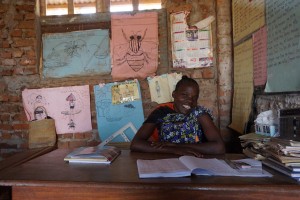 The best thing about being part of the Teacher Changemaker network is that we meet many Changemakers who give us many new skills. I have learnt the qualities of a good teacher, how to handle the classroom situation and how to make the classroom into a good learning environment.
The best thing about being part of the Teacher Changemaker network is that we meet many Changemakers who give us many new skills. I have learnt the qualities of a good teacher, how to handle the classroom situation and how to make the classroom into a good learning environment.
Being a Changemaker means being a teacher who is an all rounder, being a teacher who has a growth mind-set not a fixed mind-set and a teacher who is always ready for anything. As a Changemaker, you have to practice what you preach. You have to be innovative, influential, creative and motivate the learners.
This year I will use one micro innovation that I call ‘I do, we do, you do’. I will first do on my own as the learners watch and learn from me. Then ‘we do’ together. Then ‘you do’ – one particular learner will do as I observe and correct the work. We had some training about this. I’ve tried it before and it always works very well. Even during our teacher training, we do the exercises like this and it’s a nice technique.
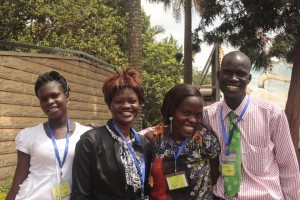 Since being involved in the Teacher Changemaker network, I have one success story about a child who didn’t enjoy learning. The child came from a long distance away, so the problem was lack of lunch, because at school we don’t provide food for the learners. I decided to talk to the parents of the child to make a plan. I started by advising them that in life there is mostly one thing: if the stomach is full, the brain will be open to learning new things, but if the stomach is complaining, the brain is focused on the stomach. The parents followed my advice and sent the child to school with packed lunch. Soon after, the learning behaviour of the child changed – they came to school early and concentrated in class. When the year ended last year, the child passed very well. After I saw the positive progress of the child, I told my fellow Changemakers in my school about the procedure I had used.
Since being involved in the Teacher Changemaker network, I have one success story about a child who didn’t enjoy learning. The child came from a long distance away, so the problem was lack of lunch, because at school we don’t provide food for the learners. I decided to talk to the parents of the child to make a plan. I started by advising them that in life there is mostly one thing: if the stomach is full, the brain will be open to learning new things, but if the stomach is complaining, the brain is focused on the stomach. The parents followed my advice and sent the child to school with packed lunch. Soon after, the learning behaviour of the child changed – they came to school early and concentrated in class. When the year ended last year, the child passed very well. After I saw the positive progress of the child, I told my fellow Changemakers in my school about the procedure I had used.
The happiest moment I have ever had is when I graduated from teaching college. I found that during my school practice I got an A! I celebrated this moment, because it’s the moment I became a qualified teacher.
I want to go to the next level of education. I want to do a degree in primary education. If I can, I’ll try East African International University in Kampala where this year’s STIR Education summit was held. I will work very hard to achieve this goal.
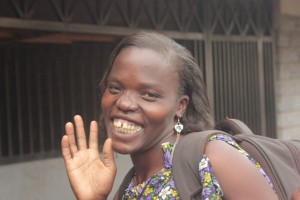 My role model is my dad because he is a teacher, so I’ve also decided to take his profession. He is a head teacher in St.Luke’s Primary School in Nwoya district. I always look at what he does and admire him because he is funny, friendly and nice.
My role model is my dad because he is a teacher, so I’ve also decided to take his profession. He is a head teacher in St.Luke’s Primary School in Nwoya district. I always look at what he does and admire him because he is funny, friendly and nice.
If I could give one piece of advice to a group of people it would be to be comfortable with change. They should not be static. If change comes, they should be open to new things. Like if a new teaching innovation is introduced we should embrace it.
Posted in News |
Tagged African Revival, Changemaker, Development, ECD, Education, Gulu, inspiration, International Development, Jumpstart!, Kampala, Nursery School, School Development, STIREducation, Teacher, Teacher training, Uganda |
Leave a comment
Posted on November 18, 2015 by Sophie Hicks
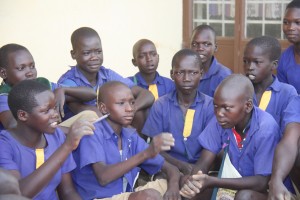 Pupils’ entrepreneurship clubs have also now been established in all 15 schools that African Revival works with through the School Demonstration Garden Project. There are 50 members with equal number of boys and girls in each school. The club members have elected their leaders and are being guided by a teacher from each school. Having selected their crops to plant, which will form their micro enterprises, members are now undergoing training on business planning and management using the School Enterprise Challenge methodology by Teach A Man to Fish. These newly acquired business skills are to be implemented within their school garden project. This practical application will serve as a unique and useful experience for these pupils, equipping them with the skills to flourish in the business of farming, leading to increased professional stability when they leave school.
Pupils’ entrepreneurship clubs have also now been established in all 15 schools that African Revival works with through the School Demonstration Garden Project. There are 50 members with equal number of boys and girls in each school. The club members have elected their leaders and are being guided by a teacher from each school. Having selected their crops to plant, which will form their micro enterprises, members are now undergoing training on business planning and management using the School Enterprise Challenge methodology by Teach A Man to Fish. These newly acquired business skills are to be implemented within their school garden project. This practical application will serve as a unique and useful experience for these pupils, equipping them with the skills to flourish in the business of farming, leading to increased professional stability when they leave school.
Otwe Pupils’ Entrepreneurship Club
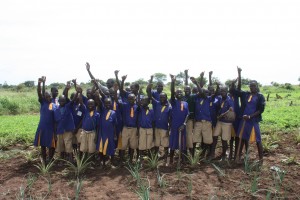
The Otwe Primary SDG Pupils’ Entrepreneurship club is in high spirits. The bean crop that they planted back in March is doing very well, despite a prolonged drought and damage from stray animals. The rain has at last come, and the pupils are seeing the bountiful effects of their hard work. Soon they hope to harvest and have already started to scout out surrounding villages and towns to assess market potential and decide which marketplace will bring them the highest profit. Head of Marketing, Boniface Rubanga, explained in more detail how the club chooses where to sell:
“Me and the marketing team go to the market and ask for the middle man, and if we think that place can fit in our needs, we can choose that middle man to take the produce.
We prefer selling our things in kilos because with these cup things they can cheat you. For Kilos, you can weigh from here and you can easily come to market and know what you are going to get.”
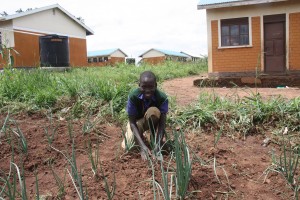 The club has recently received training in marketing skills to support them in this aspect of the project. African Revival Project Officer Babra notes that one of the principle objectives is to enable them to be self-reliant in the future:
The club has recently received training in marketing skills to support them in this aspect of the project. African Revival Project Officer Babra notes that one of the principle objectives is to enable them to be self-reliant in the future:
“We actually train them on how to produce, how to invest, how to add value to the products and how to market it […] our schools are located in the rural areas where the major activities are actually farming but the pupils have realized that the actual challenge faced is the marketing strategy.”
The skills transferred through the Pupil’s Entrepreneurship Club are helping to fill this gap in knowledge and ensure that pupils can effectively handle the post-production and financial aspect of farming.
And some of them already have interesting plans for how they will use the profits from the bean crop, a portion of which will be shared amongst group members (the rest will be added to the group account for future activities). Boniface wants to save his cut with the help of his mother, who is in the Parents’ VSLA group:
“I am in p6 and next year I am in p7. With these savings, it’s going to help me to buy some text books to help me prepare for the national examinations.”
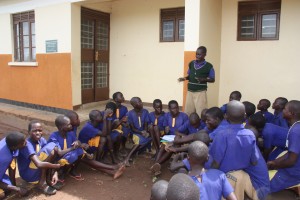 While Boniface has ambitions to become a vicar when he leaves school, he also intends to keep on farming alongside this profession in order to provide his household with a secure source of nutrition, and generate a profit through selling the surplus. As such, the business skills he is learning through the Pupils’ Entrepreneurship Club will continue to serve him well in the future.
While Boniface has ambitions to become a vicar when he leaves school, he also intends to keep on farming alongside this profession in order to provide his household with a secure source of nutrition, and generate a profit through selling the surplus. As such, the business skills he is learning through the Pupils’ Entrepreneurship Club will continue to serve him well in the future.
Posted in News |
Tagged Development, Gulu, School Development, School garden, Uganda |
Leave a comment






























